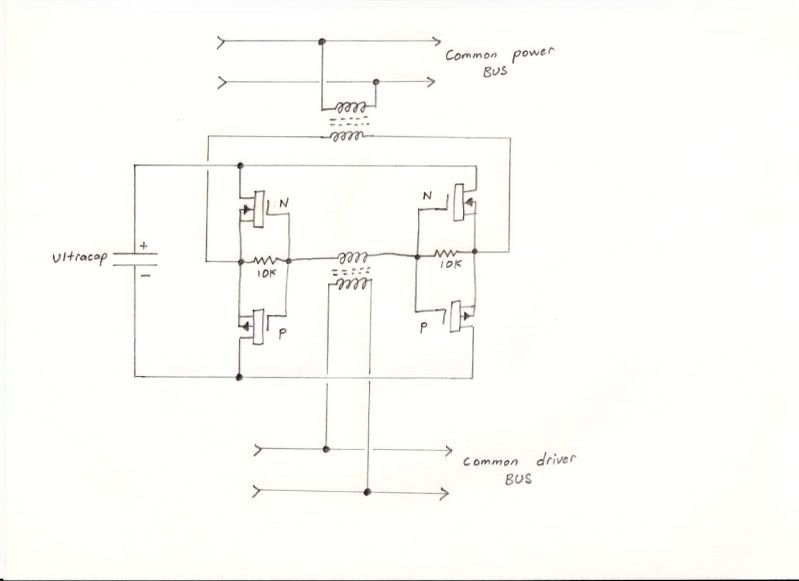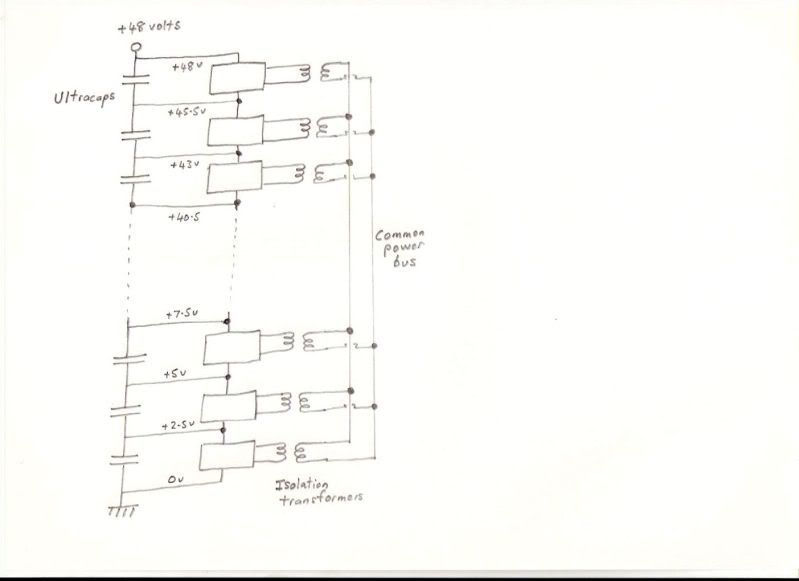
|

|
Forum Index : Electronics : Ultra Capacitors "Boost-Caps"
| Author | Message | ||||
| Warpspeed Guru Joined: 09/08/2007 Location: AustraliaPosts: 4406 |
These Ultracaps are 3,000 Farads at 2.7 volts each. That is 3,000,000,000 Micro-Farads at 2.7 volts. Ten of them in series will be 300,000,000 Microfarads at 27 volts. A MILLION times more capacitance and energy storage than you think. That is an mind bendingly huge amount of capacitance, especially in such a relatively small package. Cheers, Tony. |
||||
| herbnz Senior Member Joined: 18/02/2007 Location: New ZealandPosts: 258 |
Opps I read this thread several times my mind was not registering Farads. Now I see reason takes time to get my old brain into gear Thanks Herb |
||||
| Tinker Guru Joined: 07/11/2007 Location: AustraliaPosts: 1904 |
The chopper/rectifier is isolated from the common power bus by a second pulse transformer, so each Ultracap is completely dc isolated from all the others.  Warpspeed, you lost me with this paragraph, how can you connect several ultracaps in series and have them completely DC isolated from one another at the same time? Remember, the point of fitting a bank of series connected ultracaps in parallel to a battery bank was for the ultracaps to absorb & provide rapid changes in charge/ discharge current. To do that one must allow very heavy DC currents to flow to and from between the cap bank & battery bank. I'm afraid your transformer coupling will fall severely short in that respect. The idea of equalizing the charge on each series connected cap has merit and I'm actually experimenting with a circuit right now that's a bit more capable than the trickle current diode/LED affair Mr. Delanco posted. But I do think doing what you suggest might make that process just a trifle too complicated  . .
I would anticipate that for 99% of the time the equalizing network in my setup does exactly nothing. It does not even come into play until the caps are getting very close to their Voltage rating. The battery bank max voltage (set by the MPPT charge controller) is always less than the combined max cap series Voltage. So, as the caps are getting nearly full - and the MPPT controller has reduced the possible charging current coming from the solar panels already at that stage - the equalizer makes sure none of the caps can exceed its rated Voltage due to uneven charge acceptances. In a short time my setup will be ready to prove my point but I think the ultracaps will be reasonably close in their charge / discharge characteristics to make the difference quite small. And, being equalized every time they get near full should guarantee that difference stays small. Klaus |
||||
| Warpspeed Guru Joined: 09/08/2007 Location: AustraliaPosts: 4406 |
Warpspeed, you lost me with this paragraph. And: I would anticipate that for 99% of the time the equalizing network in my setup does exactly nothing. It does not even come into play until the caps are getting very close to their Voltage rating. The power can shuffle backwards and forwards between any and all Ultracaps as an ac signal that completely dc isolates every Ultracap from every other Ultracap. This is required, because even though the Ultracaps are directly series connected in a long string, the "top" Ultracap will have one leg connected to full battery voltage, and the "bottom" ultracap has one leg grounded. The difference could be several tens of volts. 
The amount of current needed to be shifted around will depend on how different the Ultracaps are. If the max difference in capacitance is 5%, then 5% of the charging current needs to be moved to hold the voltages the same. Say one amp for every 20 charging amps maybe ? That should not be difficult to achieve. And as you say, charge equalization is not required 99% of the time, and this circuit could be disabled by simply powering down the master timing oscillator. It probably only needs to be activated during heavy charge or discharge, or when near peak voltage. Anyhow, the whole idea is just a suggestion for the more adventurous. Cheers, Tony. |
||||
MrDelanco Senior Member Joined: 12/11/2011 Location: United StatesPosts: 101 |
Hello All; Warpspeed I have a question for you , Would your design work as well if it was installed on every other cap instead of every one of the caps in the bank ? Being a balance circuit and just by balancing every other cap you would force the orphan caps in the bank to auto balance to the balanced one's. Regards Robert. MrDelanco:Project Videos It is not only too know what it does but to understand how it does what it does. |
||||
| Warpspeed Guru Joined: 09/08/2007 Location: AustraliaPosts: 4406 |
Robert, It will equalize the voltages between all the Ultracaps that are interconnected to the common ac power bus, through their own individual bidirectional chopper/rectifier circuits. Any Ultracaps not included into this voltage equalization system will continue to behave completely independently. Cheers, Tony. |
||||
MrDelanco Senior Member Joined: 12/11/2011 Location: United StatesPosts: 101 |
It will equalize the voltages between all the Ultracaps that are interconnected to the common ac power bus, through their own individual bidirectional chopper/rectifier circuits. Any Ultracaps not included into this voltage equalization system will continue to behave completely independently. Tony; This is a test on the DC voltage of a positive grounded system. This test showed that the caps will find their own balance if a controlled charge is induced. I floated a stable charge from a charge controller into a bank of ultra-caps for the last 20 days without the charge balance circuit and found that the ultra-cap bank has held itself at a balanced state of charge. I am going to install this into the system paralleled to one of the inverters and test it for a few weeks. Cheers Robert MrDelanco:Project Videos It is not only too know what it does but to understand how it does what it does. |
||||
| Georgen Guru Joined: 13/09/2011 Location: AustraliaPosts: 462 |
I looked at the prices of 2.7V ultra capacitors and it is expensive for me. Also it says in some places that nothing else is needed, no charge controllers, no nothing. Then it say but you cannot exeede voltage, so it is sensitive. Will read more. Not being electronic enthusiast with lots of knowledge I can see myself as too high risk to those expensive pieces of equipment. George |
||||
| Warpspeed Guru Joined: 09/08/2007 Location: AustraliaPosts: 4406 |
There are two issues, differences in capacitances and differences in leakage current. If the ultracaps have different capacitance, (say 10% different), then if you rapidly charge a series bank of them, the final voltages will end up being 10% different. Even if all the ultracaps start out having exactly the same voltage. Over very long periods of time, the ones with higher internal leakage current will self discharge faster. So if you connect up a bunch of random ultracaps that are all very slightly different, and start seriously using them, over a long period of operation, the voltages may start to become very uneven. To get the most bang for your dollar, you really need to run these ultracaps up fairly close to their max rated voltage. But the closer you get to max, the more critical voltage variations become. So some kind of voltage control or limiting system starts to look like an attractive proposition. How you do it, and how well you decide to do it is entirely up to you. But to just do nothing, may result in some fairly expensive ultracap failures if the maximum voltages go completely out of control. Cheers, Tony. |
||||
MrDelanco Senior Member Joined: 12/11/2011 Location: United StatesPosts: 101 |
Hello Tony Well the tests are complete. If every other caps voltage is controlled the orphan caps hold stable too the controlled caps. You are correct if you rapidly charge a series bank of them they are charged unevenly by more then 10% but if they are slowly charged with a controlled system the orphan caps hold true too the controlled caps voltages. With the charge balance circuit on every other cap the ultra-cap bank has held itself at a balanced state of charge. Without the charge balance circuit the ultra-cap bank will run wild by more the 10% and not hold a balanced state of charge. At-least every other cap in a cap-bank needs too be charged-controlled. Cheers Robert. MrDelanco:Project Videos It is not only too know what it does but to understand how it does what it does. |
||||
| Georgen Guru Joined: 13/09/2011 Location: AustraliaPosts: 462 |
Noticed some 3000F Supercapacitors 2.5V on E-Bay for $25, where postage is almost as expensive as the item bought. At this price it starts to look affordable. Problem is how to go about it and how to arrange: > voltage balancing < (I was mentioned that from 3 capacitors in series voltage balancing is essential) George |
||||